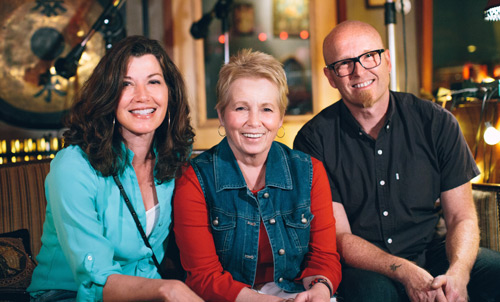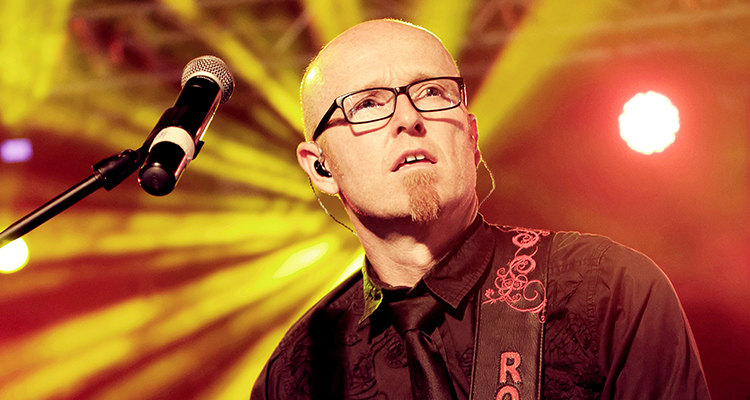Why now? I feel like, honestly, God opened a door for me and gave me a little green light. Because like I said, it’d been a desire for a long time. I was able to go to the Holy Land in 2013 with some friends, and we went with a group called The Telos Group from Washington, DC. It’s pilgrimage of holy sites, but also you get to meet people who are engaged in peacemaking in the Palestinian and Israeli conflict. That absolutely blew my mind, and it’s something that is very close to my heart. I sat on the hillside overlooking the Galilee—where those words were spoken—twice in two weeks in that first trip and it changed me in some way. When I came back from that, I wrote the first song with Anthony Skinner. Then I went on to write with John Mark McMillan and All Sons & Daughters. It just felt like, “Okay, let’s record these first three songs and see if we’ve got a green light on the project.” And that’s what we did. That’s how it kicked off into this creative phase.
CCM: To briefly touch on the companion book, Words From The Hill, can you speak to the dichotomy of working with the likes of such artists as Amy Grant and Michael W. Smith on the musical side, but to then turn right around and pour into the lives of those that would be considered the “meek”—all in and for the same project?
SG: The great thing about Amy is that she is a complete and legit superstar, and yet she’s interested in the lowliest person that you can imagine. Once we were sitting down in the green room on a show we were playing together—also with Michael W. Smith—and she asked, “What’s going on in your world? I’m really interested.” So I told her about this baby project I was working on and she was intrigued. She was intrigued in a way that surprised her, because she thought the things I was talking about with the Beatitudes were for the holy and the spiritual. The way that I explained it was that it was for the broken and the lost and every human on the planet. She was very drawn to that. She said, “Is there anything I can do to help?” And I said, “Well, would you consider writing a song with me?” She said, “Yes,” straight away. It surprised me, and it took me a couple of months to pluck-up courage to get back with her on my idea.
The thing that we wrote about for the project was about a woman who had been on death row for 27 years and had her sentence commuted to a life sentence. At the time we spoke to her, she was on parole, so the conversation was, “What does mercy look like to you—when you faced your execution within 72 days and yet, you got your life back… What does that look like?” That’s where the song “Morning Light” came from. I’m just really grateful for Amy because she said, “Every human being in the course of just trying to survive will make decisions within which they don’t recognize themselves.” I thought that was an amazing insight.

For Michael W. Smith… We were in Japan playing together and he got the call that his father was taken very ill and was basically about to pass. So, Michael had to leave and go home. We wrote the song, “Carry On,” which is the “blessed are those who mourn” theme from a very personal kind-of place. And I think that is what marks every single song on this record. It doesn’t matter how famous anyone is, or how together it looks like you’ve got it from the outside. Everyone, including Joel [Houston] from Hillsong UNITED and Martin [Smith] from Delirious?, everyone has written from a place of vulnerability and the fact that God is on the side of you when things are broken and not working out.
Some of those songs are about the invitation that we have in the Beatitudes to get back on the hillside where we live, and to open our eyes and look around us to see the other as our neighbor and to show mercy, to become peacemakers, to be holy troublemakers, and stick up for those who have no voice—to swim against the powers that be in the world. So, a lot of those songs, whether they were from legends like Michael and Amy, or from relative unknowns like Terrian Bass—who was 19 years old when we wrote the song “Let My Dreams Fly.” Her life has been growing up in North Memphis in a really poor neighborhood full of crime and drug and domestic abuse and gang violence. That’s where we wrote the song from. She helped educate me in terms of who the meek are in the poor African American neighborhoods and the struggles for racial reconciliation. For a white English man, it was a complete education for me. I am incredibly grateful for her.
CLICK “4” TO ADVANCE


Leave a Reply
You must be logged in to post a comment.